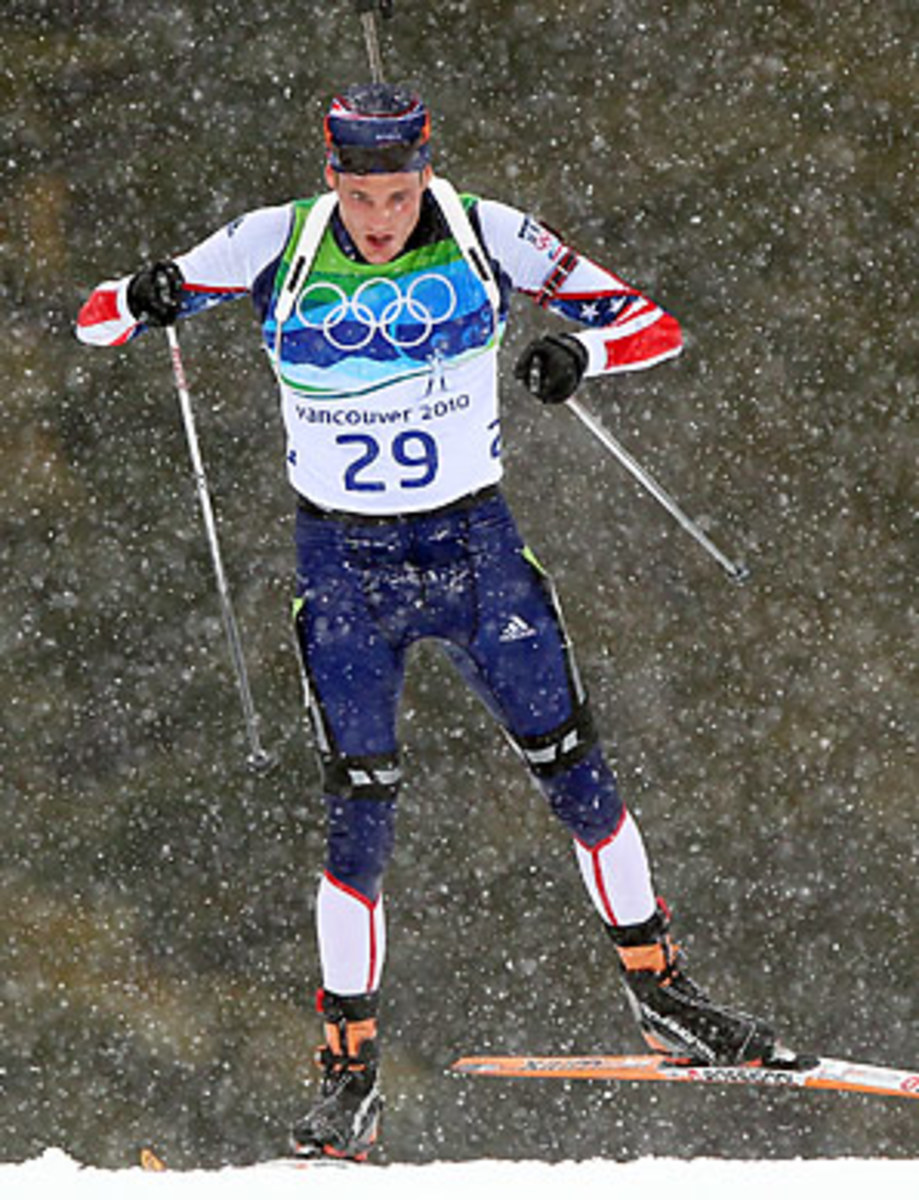
Burke relishes chance to boost biathlon's profile -- and to medal
Tim Burke, the top U.S. biathlete, tends to get asked what, exactly, it is that he does. When he left Europe for Vancouver last month for a final stint of pre-Olympic training, Burke landed in Chicago for a connecting flight and got that very question from a curious customs officer. After Burke told the man that he competes in biathlon, "he asked me if biathlon is a combination of handball and something else," says the 28-year-old Burke. "I can't even remember what the other thing was. I stopped listening when he said handball."
The customs officer can hardly be faulted. Few North Americans in his position would have cross-country skiing and rifle shooting on the tip of their tongues. (But handball?) The number of people who compete in biathlon in the U.S. is probably in the triple digits. A long tradition of U.S. futility in the sport hasn't done much to breed familiarity either. Biathlon is the only winter sport in which the U.S. has never won a medal. Nor have Americans gotten particularly close.
The outlook was so barren just a decade ago that even the U.S. Olympic Committee essentially kicked biathlon to the curb. USOC funding for biathlon sunk so low that Burke and some of his teammates relied on the non-profit Maine Winter Sports Center, where they lived and trained. Lowell Bailey, the second-ranked U.S. biathlete in Vancouver, left the sport in 2002 for two years after deciding he no longer wanted to live in a sporadically heated double-wide trailer in Jericho, Vermont. "I was like, wow, this is really difficult when you have to wake up and crack ice on the toilet," says Bailey.
Despite the lean times, Burke has been a biathlon devotee since he was 16, when, growing up in Paul Smiths, N.Y., near Lake Placid, he realized that he wasn't bound for fame competing in the Nordic combined (no, that doesn't involve handball either) because he wasn't a crack ski jumper.
After a promising showing in Turin in 2006 -- the men's 4x7.5 km relay took 9th -- the USOC increased biathlon funding fourfold to $1 million a year. The extra money allowed U.S. Biathlon to bring in a new, European coaching staff that overhauled the team's training. Head coach Per Nilsson from Sweden taught Burke what hard work really was, increasing his summer conditioning training hours from 20 per week to 30. Shooting coach Armin Auchentaller from Italy helped Burke refine the skill of shooting at tiny targets (4.5cm in diameter from the standing position, 11cm if prone) from 50 meters away while his heart was beating 180 times per minute. "Your body wants to gasp for air, but you're trying to hold your breath basically," says Burke.
Under Auchentaller's instruction, Burke practiced taking his rifle off his back and loading a clip 100 times a day in his apartment with the lights off. He also taught Burke a few veteran's tricks: Start pushing off with your poles as soon as you're done shooting, and only worry about getting your hands in the pole straps once you're speeding on your way. "That might save me a second every time I leave the shooting range," Burke says. "It could be 5 to 10 seconds over the course of a race."
On December 20, the USOC's investment paid off. Burke finished 6th in a race in Pokluka, Slovenia, which made him the first American to ever top the overall biathlon World Cup points standings. "When I started on the World Cup in 2004," Burke says. "I was almost looking up to the guys I was competing against. It took a few years to realize I was there to race them and beat them." (Burke finished the World Cup season fifth.)
In the first week of the Olympics, Burke's hopes in the 10 km sprint and 12.5 km pursuit were torpedoed by erratic weather -- the sprint race start is staggered, and it began raining just before he took off (and the outcome of the sprint determines each racer's starting deficit for the pursuit). But Burke's best shots to medal are still to come. On the World Cup circuit, he has top-three finishes in both the 20 km individual race and the 15 km mass start, and those events will be contested at the Olympics today and on Feb. 21, respectively.
If Burke succeeds, he is likely to bring much more attention to biathlon -- and to himself. He is already huge in Germany, and not just because he dates two-time Olympic gold-medal winning biathlete Andrea Henkel of Germany. "I got a lot better at taking pictures because people would ask me to take their picture with Andrea," Burke says. "But that changed a lot last year with the World Cup. Now they want me in the pictures."





